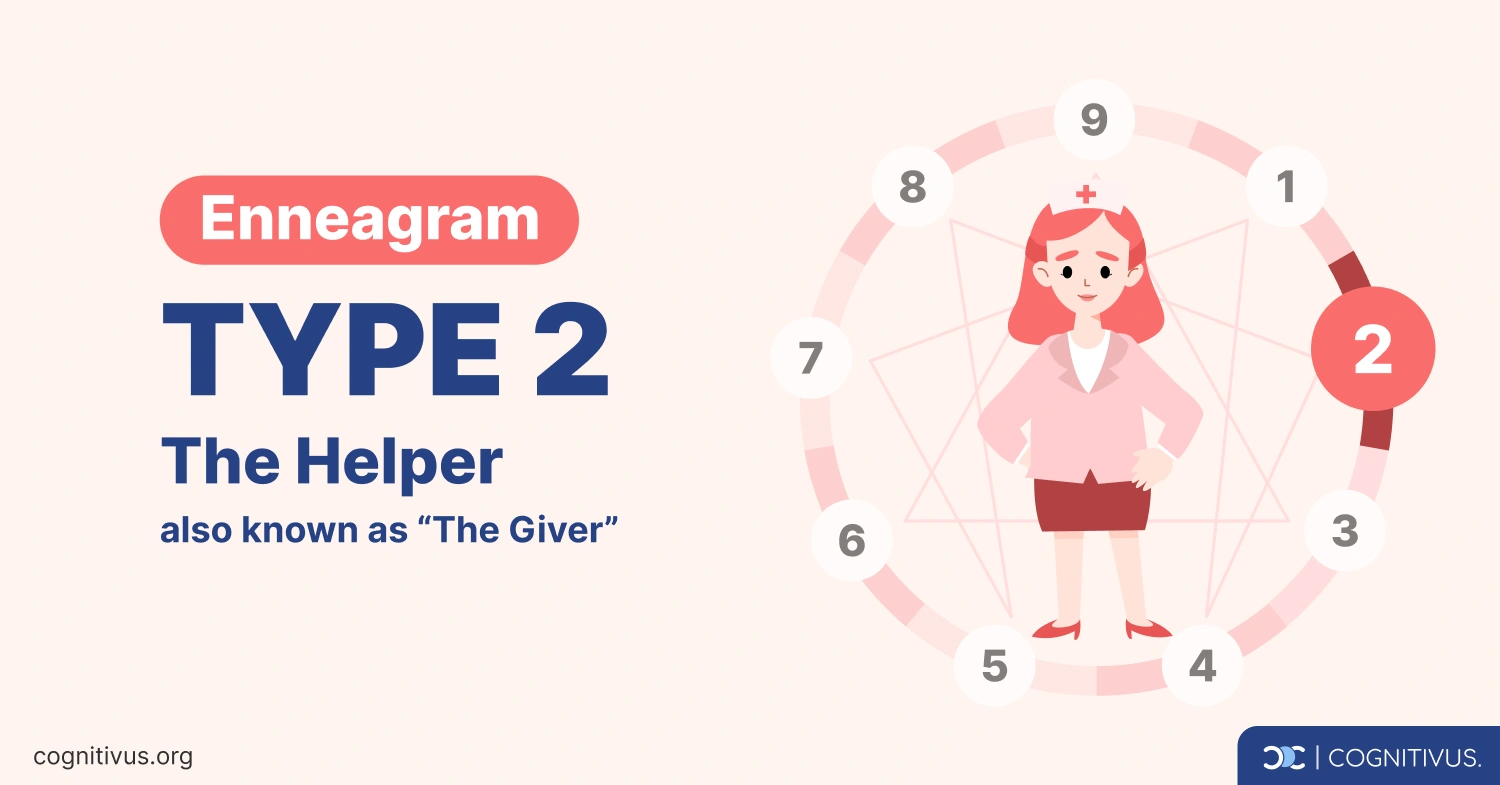This guide examines the core characteristics, emotional experiences, strengths, and challenges of Enneagram Type 2, often referred to as “The Helper.” Whether you identify as a Type Two or are just interested in understanding someone who is, this resource offers helpful insights into understanding the key traits, emotional drivers, and complexities that make Type Twos unique.
Enneagram Type 2 Description
Key characteristics of Type Twos
Enneagram Type Twos, known as The Helpers or Givers, are warm, nurturing, and empathetic individuals who find their self-worth in their ability to support others. If you’re a Type Two, your main goal is to create connections and ensure that people feel loved and supported. You often prioritise others’ needs before your own, feeling a sense of fulfilment when you lend a helping hand or provide emotional support.
Imagine yourself as the person who picks up on someone's struggles, even when they haven’t said anything. You instinctively know how to be there for and help others. However, while you focus on nurturing these relationships, you might overlook your own emotional needs, therefore seeking validation through the approval of others. You give so much of yourself that you may forget to take a moment and ask: “What do I need?”
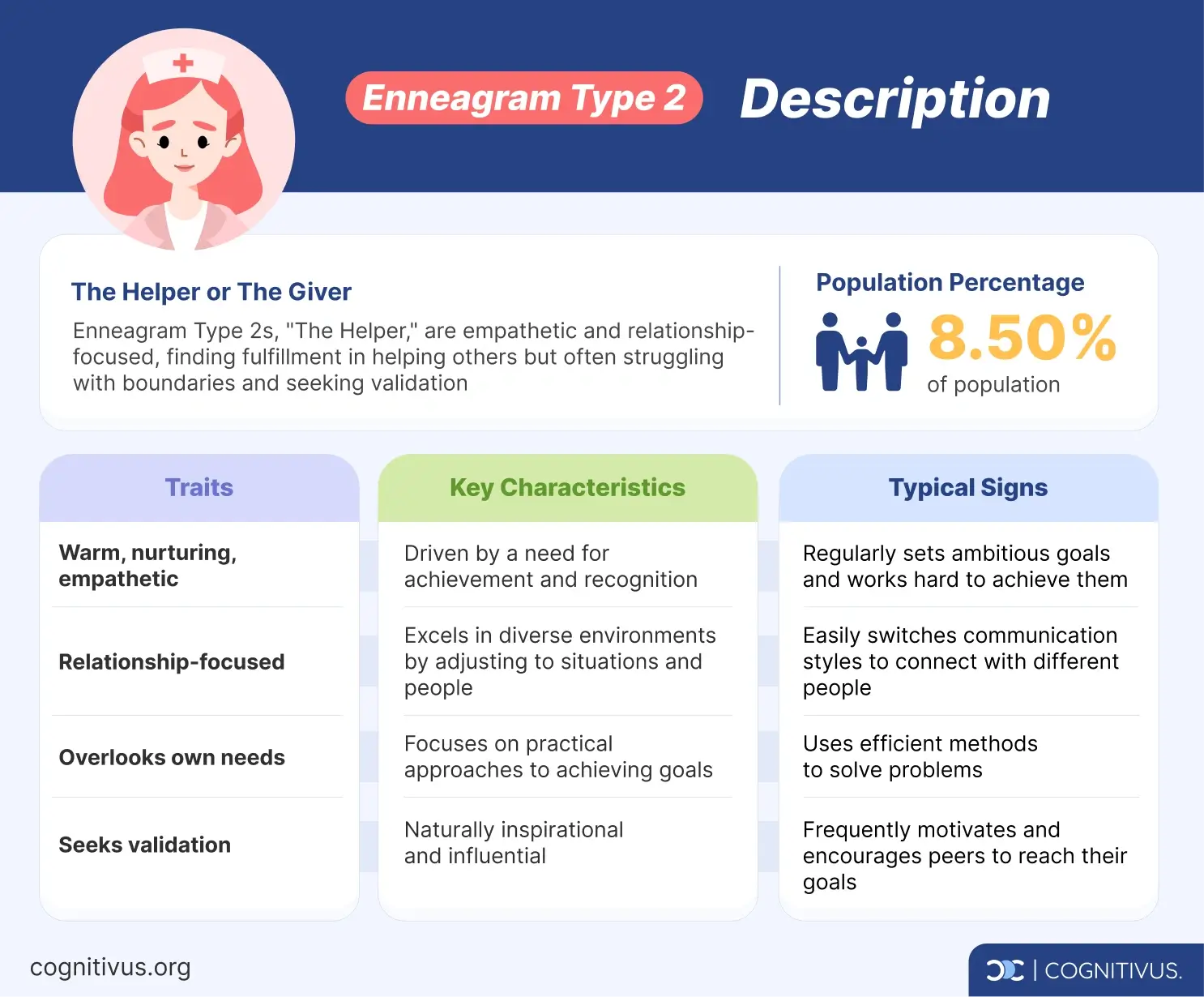
How to recognise an Enneagram Type 2
If you’re a Type 2, you naturally pick up on how people are feeling and what they need. Whether it's offering emotional support or lending a hand with a small task, you are the go-to person that people will turn to. You just have that natural empathy and heightened intuition; you always seem to know how to raise people's spirits!
You’re also super relationship-focused and thrive when they are strong and healthy. Your happiness, a lot of the time, comes from being openly appreciated by others. Since your need for appreciation is so high, it’s crucial for you to feel recognised and valued for your efforts. When people overlook what you do, it can leave you feeling unappreciated or ignored.
Due to the fact that you often put other people’s needs before your own, it can be really hard for you to say no sometimes. You might find yourself taking on way more than you can handle, just because you don’t want to let anyone down. This can leave you feeling worn out or underappreciated for all the effort you put in. Also, in your devotion to others, you may forget to take care of yourself. This can lead to feeling emotionally drained or burnt out because you’re so focused on everyone else that your own needs get neglected.
If you’re not sure which type you are, taking an Enneagram test can help you discover your Enneagram type and provide a deeper understanding of yourself or those around you.
How rare is Type Two?
Type Twos make up about 8.50% of the population, meaning they are a bit less common than other types. Type Twos are known for their caring and supportive nature, and these traits might be more noticeable in cultures that value helping others and strong relationships. Societies that emphasise community and caregiving roles tend to have more people with Type Two characteristics.
The most common Enneagram wings for Type Twos are Type One (4.85%) and Type Three (3.66%), which shows that many Type Twos blend their helpful nature with either a more responsible, perfectionist side or a more ambitious, success-driven side.
Emotional Traits of Type Two
Core fear and desire
At the core of every Type Two is the fear of being unloved or unwanted. To combat this, you strive to be needed and appreciated, often giving generously and going above and beyond to ensure that others recognise your worth. Your deepest desire is to be loved unconditionally; you try to earn this through acts of service and emotional support.
In your day-to-day life, this might mean you go out of your way to support friends, family, or even colleagues, believing that the more you give, the more you’ll be valued. While this often creates deep and meaningful relationships, it can also create a pattern where your self-worth and esteem become interlinked to how much others recognise your efforts.
A heart-driven nature
Being heart-centred, Type Twos are deeply in tune with their emotions and are driven by the desire to form meaningful bonds. You are constantly attuned to the emotional needs of others and are quick to step in when someone feels hurt, lonely, or needs care. This makes you incredibly empathetic but also emotionally vulnerable when your efforts are not reciprocated or appreciated.
The core emotion associated with Type Twos is pride, which may manifest as a tendency to believe that you are indispensable in the lives of others. When unacknowledged or taken for granted, this pride can actually shift into resentment, leaving you feeling underappreciated despite all your hard work.
Strengths and Weaknesses
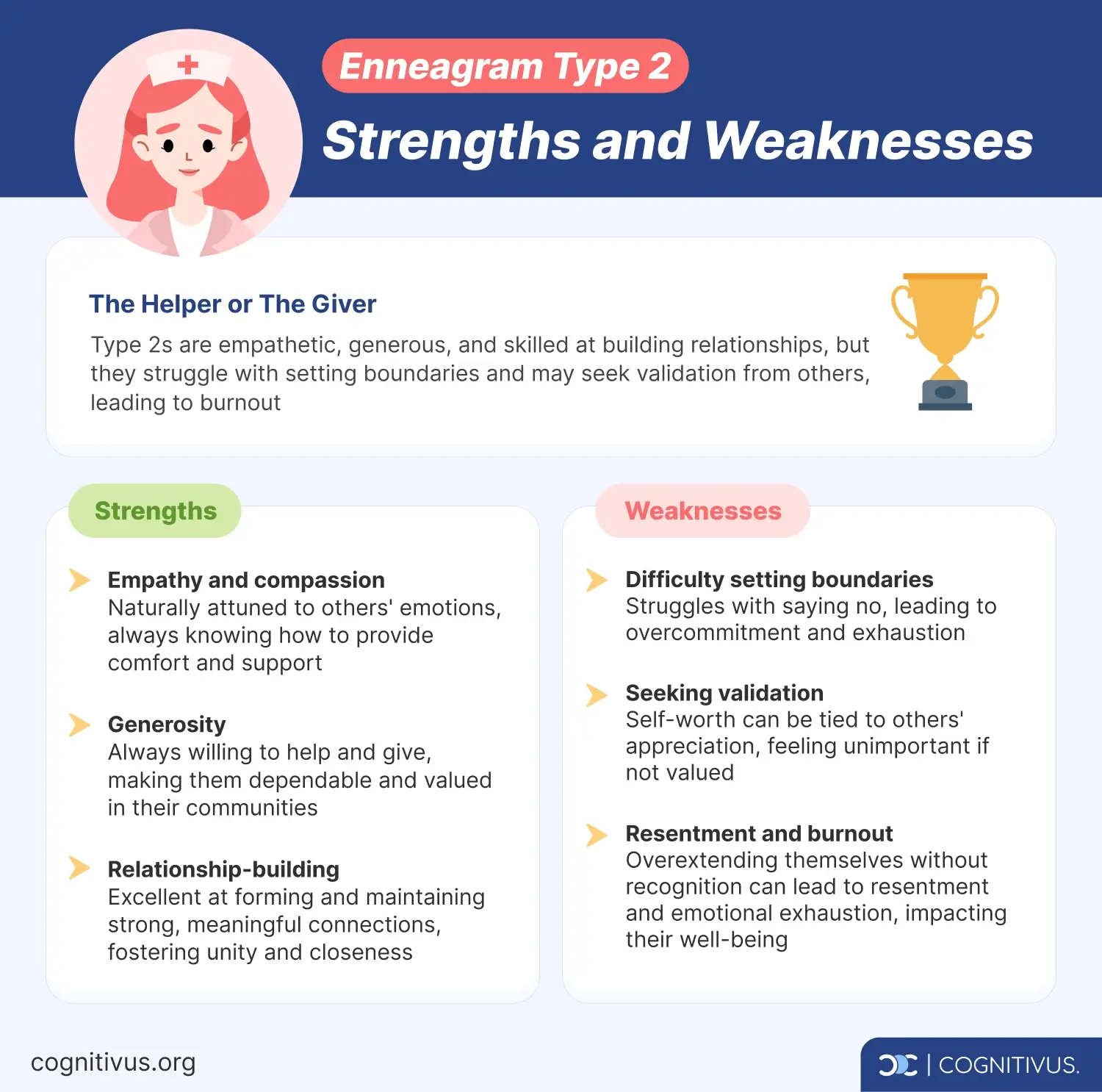
Key strengths of type 2s
- Empathy and compassion: You’re naturally tuned in to the emotions of the people around you and have a special talent for understanding how others feel. Whether someone is sad, stressed, or happy, you seem to always know the right thing to say or do. Due to this, people feel truly understood and cared for when they’re with you.
- Generosity: Your willingness to help others stands out. You’re always ready to give- whether it’s your time, a shoulder to cry on, or practical help with a task. People rely on you because they know they can depend on you to be there. This giving nature makes you an important part of any community, and your kindness doesn’t go unnoticed.
- Relationship-building: You really excel at forming strong, meaningful connections; your caring and supportive nature makes it easy for you to do so! Whether it’s with friends, family, or coworkers, you’re often the glue keeping everyone together. You make an effort to nurture and maintain these relationships, which helps create a sense of unity and closeness in your circles.
Key weaknesses of type 2s
- Difficulty setting boundaries: A major challenge for a Type Two is saying no. Your strong desire to help can sometimes lead you to overcommit yourself, leaving you feeling exhausted and overwhelmed, especially if people start to rely on you too much or take advantage of your generosity.
- Seeking validation through others: Sometimes, your self-worth can be tightly tied to how much others appreciate what you do for them. If your efforts are not noticed or valued, it can make you feel unimportant, and you may depend on outside approval to feel good about yourself.
- Resentment and burnout: When you pour so much of yourself into others and don’t get that appreciation back, it can build up resentment, and you might start to feel like people are just using you. Eventually, this can lead to burnout, leaving you feeling drained and worn out from always prioritising others. If it continues, it can even take a toll on your well-being, making it harder to keep your relationships.
Enneagram Type 2 Wings Explained
In the Enneagram system, each type has two neighbouring wings that add an extra twist to your personality. The Enneagram wings influence how the core traits are expressed, giving each person a unique mix of characteristics. For Type Twos, the wings are Type 1 and Type 3, and they influence how you help others and approach relationships.
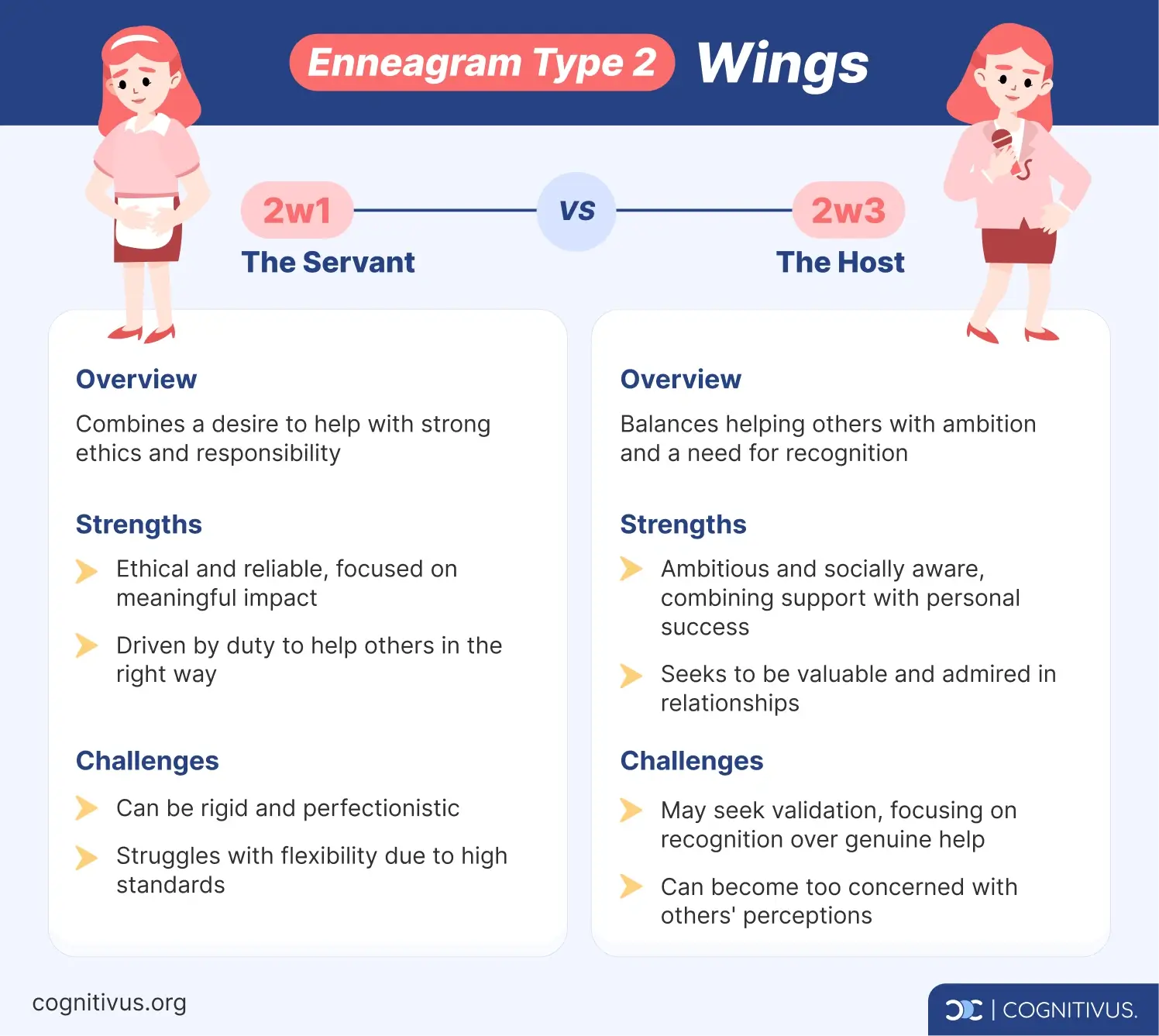
Enneagram type 2w1 (The Servant)
If you’re a Type Two with a Enneagream One wing, your natural desire to help others comes with a strong sense of responsibility and ethics. So, while you enjoy supporting other people, you also need to do things the “right” way, holding yourself to a set of values and high standards.
You likely have a strong sense of duty and might go above and beyond to ensure that everything you do is meaningful and serves a higher purpose. For example, if you’re helping a friend, you might also be thinking about how your actions can make a long-term positive impact on their life. While you are reliable and trustworthy, this wing can make you a bit rigid, as you may get stuck on doing things perfectly instead of being flexible when needed.
Enneagram type 2w3 (The Host)
If you have a Type 3 wing, your desire to help is paired with an ambition to be successful and admired. With this wing, you’re not only focused on supporting others- you also want recognition for it. You are likely more aware of how others perceive you, which can drive you to excel in your role. You want to be seen as someone who is valuable and indispensable in your relationships and social circles.
This wing makes you more socially savvy and ambitious. You might use your helpful nature to advance in your career or social life, combining your supportive nature with a desire for personal achievement. On the flip side, you may become more focused on how you are perceived rather than the act of helping itself. Through the seeking of validation from approval from others, your genuine desire to be of service may be overshadowed.
Enneagram Type 2 Subtypes Explained
Like all Enneagram types, Type 2 has three subtypes: self-preservation, social, and one-on-one (also called "sexual"). These subtypes show different ways in which Type 2s express their desire to help and connect with others.
Self-Preservation type 2 (2SP)
You focus on practical support and want to make sure everyone is comfortable and safe, including yourself. You show love by providing things like food, shelter, or any other form of physical help. You feel happiest when you know that the people you care about are well looked after, and you also value security in your own life. Sometimes, this subtype can struggle with asking for help, even when they really need it, because they want to be seen as strong and capable.
Social type 2 (2SO)
Social Twos seek to be loved and appreciated within their larger social circles. If this is your subtype, you find joy in being a part of groups and communities, where your helpful nature shines. You're the one who always steps up to organise events, support friends, or lend a hand in group settings. You want to feel valued for your contributions, but this focus on social connections can sometimes lead to overworking yourself trying to please everyone.
One-on-One type 2 (2SX)
One-on-One Twos invest energy in creating close, meaningful relationships with people they care about, wanting to be the most important person in someone’s life. You work hard to make sure those you love feel special. This subtype often shows their care through intense emotional support and one-on-one time. While this can lead to strong, loving bonds, it can also cause feelings of jealousy or disappointment if the relationship doesn’t feel as close as you’d like.
Healthy and Unhealthy Levels of Type Two
Enneagram Type Twos are naturally generous and caring, but their emotional well-being can vary depending on how they manage their desire to help others. Here’s an exploration of how they can show up at different levels.
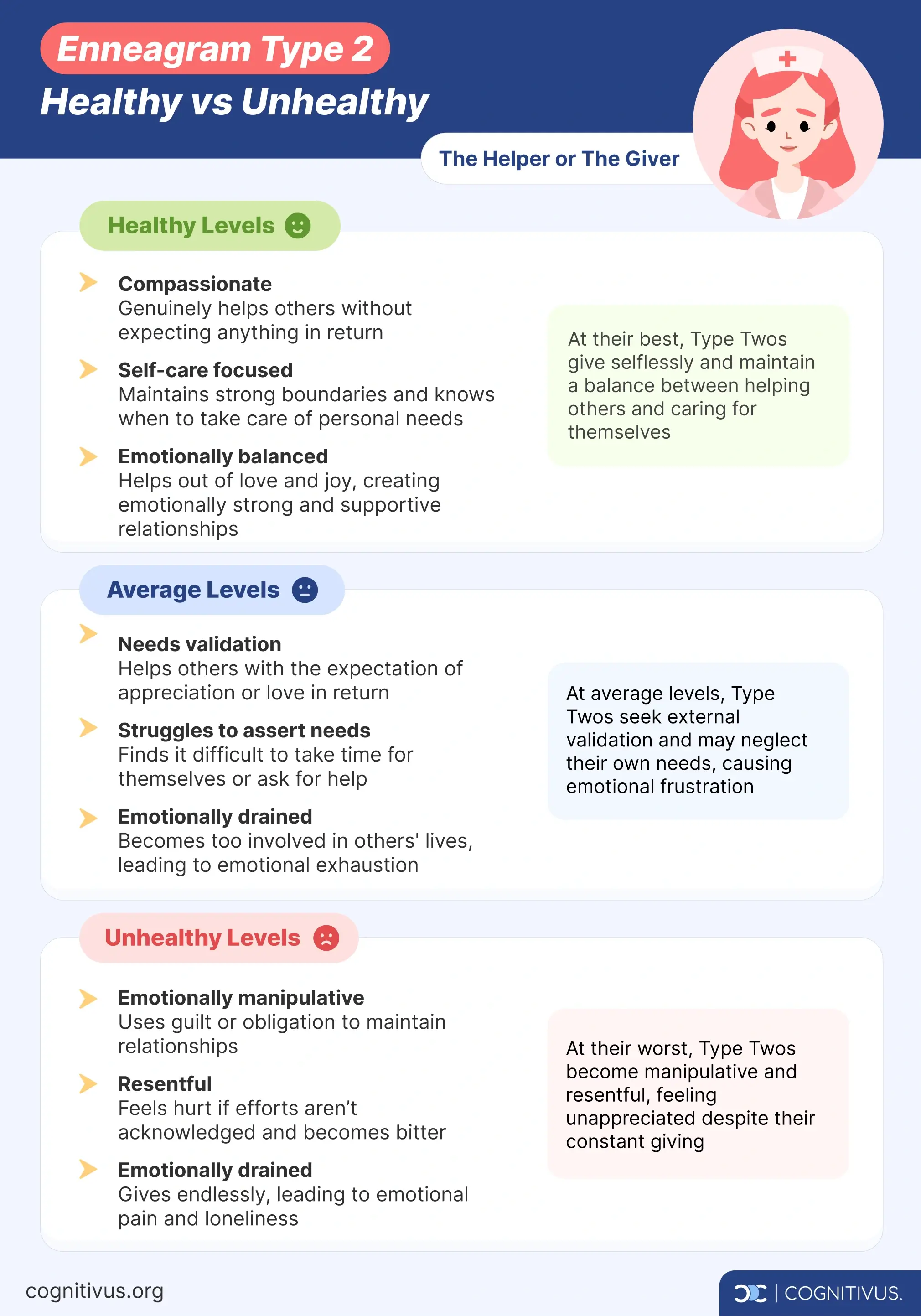
Healthy levels
Healthy Twos give from a place of true compassion and love, without expecting anything in return. They genuinely enjoy helping others because it brings them joy, not because they’re seeking approval or validation. They know that their worth doesn’t depend on how much they do for others, allowing them to maintain strong boundaries, know when to say ‘no’ and take care of themselves too.
For example, a healthy Type Two might happily cook dinner for a friend who’s having a tough day, simply to make them feel better. They do not expect praise or for the favour to be returned, but simply because they just care. They recognise that taking care of themselves is just as important as caring for others, and this balance allows them to be emotionally strong and supportive without burning out.
Average levels
At an average level, Twos still want to help others, but they may start to expect something in return, like love or appreciation. They may also struggle to assert their own needs, finding it difficult to ask for help or take time for themselves, which can lead to emotional exhaustion or frustration. At this stage, since their actions may be more motivated by a desire to feel needed or validated, they can get too involved in other people’s lives, to the point of neglecting their own needs.
For instance, an average Two might offer to help a coworker with a project, hoping that this will make them more likeable or earn them praise. But, upon not receiving the appreciation they were hoping for, they could feel hurt or unappreciated.
Unhealthy levels
Unhealthy Twos might become emotionally demanding or try to manipulate relationships by using guilt or obligation. They need others to depend on them and feel deeply hurt and resentful if their efforts aren’t acknowledged, which can lead to resentment. This can lead to emotional outbursts, passive-aggressive behaviour, or even withdrawal from the relationships they once nurtured. In their most unhealthy state, Twos can feel unloved and empty, even though they continue to give endlessly, leading to deep emotional pain and loneliness.
For example, an unhealthy Type Two might help a friend move to a new house, but if the friend doesn’t express enough gratitude, the Two could become bitter. They might say things like, "After everything I’ve done for you, this is how you treat me?" This type of behaviour can strain their relationships, as others may feel burdened by the Two's unspoken expectations.
Enneagram Type 2 in Relationships and Work
Enneagram type 2 at work
Twos are known for being team players and natural supporters in the workplace. You thrive in roles where you can make a meaningful impact on others, such as counselling, teaching, healthcare, or customer service. However, you may overcommit and take on too much due to your desire to help, which can leave you feeling drained. Setting boundaries and prioritising self-care are key to staying balanced and avoiding this burnout.
Enneagram type 2 in relationships with friends and family
You’re the dependable and nurturing friend/family member who is always there for others. You are likely the person who remembers birthdays, offers a listening ear, and goes out of your way to make others feel special. However, you must ensure that your relationships stay balanced and that you’re not neglecting your own needs in the process.
Enneagram type 2 in romantic relationships
In romantic relationships, Type Twos are deeply loving and attentive partners. You thrive on making your significant other feel cherished and supported, often going out of your way to meet their emotional and practical needs. Whether it’s offering words of encouragement or planning thoughtful surprises, you take pride in nurturing the relationship.
However, it’s important to remember that a healthy relationship involves mutual care, where both partners give and receive love equally, so again, do not forget to take care of your own needs too. Communicating your needs and allowing your partner to support you in return can create a more balanced and fulfilling connection.
How to Grow as a Type Two
While Type Twos are naturally caring and giving, personal growth involves finding balance between helping others and taking care of yourself. Here are a few ways to grow as a Type Two:
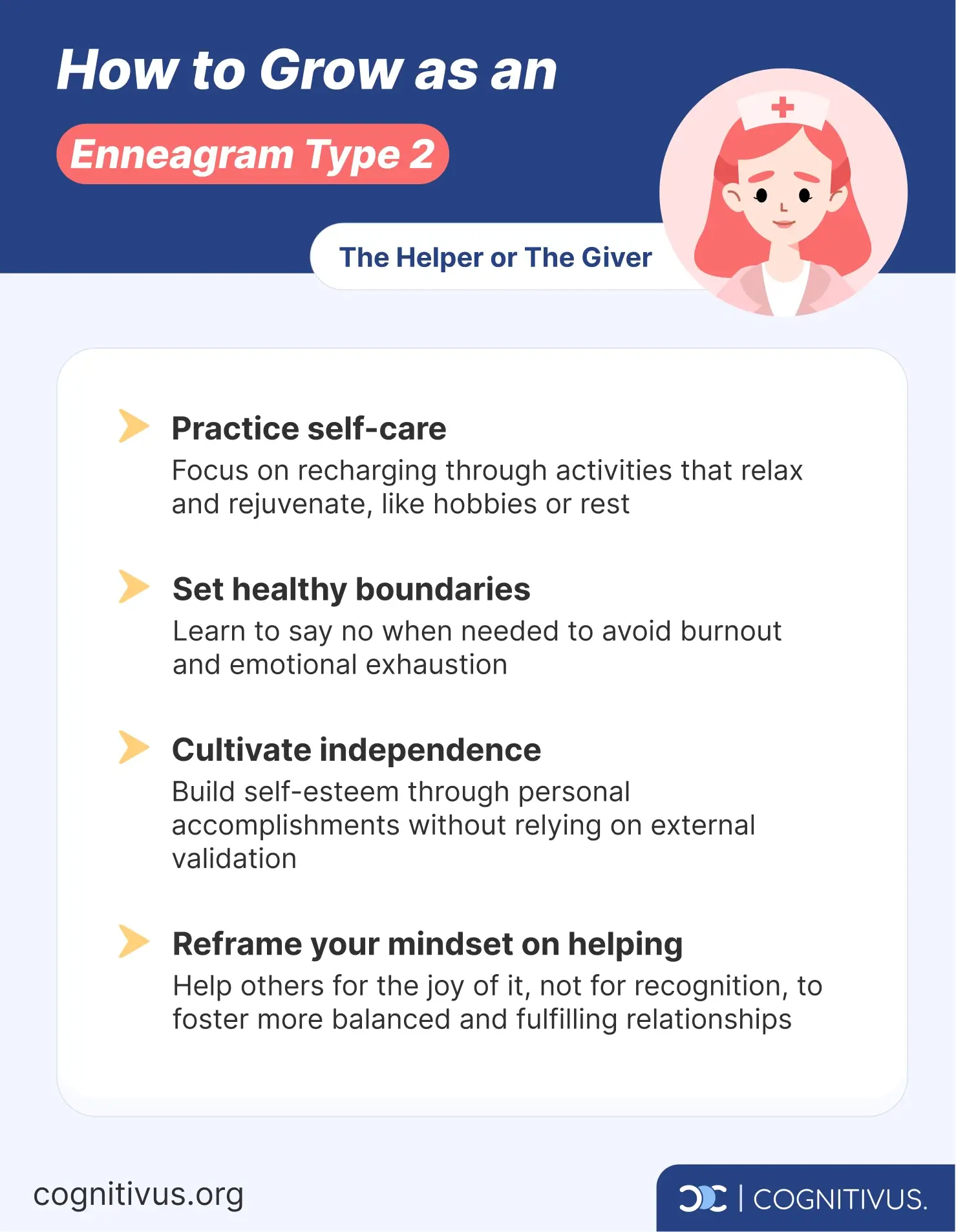
Practice self-care
You’re naturally focused on taking care of others, but it’s equally important to look after yourself. You cannot pour from an empty cup! Practising self-care looks different for everyone, whether it's relaxing, going for walks, enjoying hobbies, or getting enough sleep; make time for things that recharge you! For example, if you’ve spent a week helping your friends with their problems, set aside a day just for yourself to unwind.
Set healthy boundaries
It's completely ok to say no. Overcommitting yourself can lead to emotional exhaustion and burnout, so knowing your boundaries and needs is key. For instance, if a friend asks you for help but you’re already feeling overwhelmed, it’s okay to politely decline. You could say something like, "I really wish I could help, but I’m feeling a bit stretched right now." This doesn’t make you any less caring; it just means you’re respecting your limits.
Cultivate independence
While you love being connected to others, it’s important to also find happiness and worth within yourself. Focus on building your self-esteem in ways that don’t rely on external praise, so you do not need others to validate your worth. Try doing things that make you feel accomplished, like taking on a personal project or learning a new skill. Whether it’s painting, gardening, or learning a new language, finding fulfilment in your interests helps you become more self-reliant and confident.
Reframe your mindset on helping
Help others because it brings you joy and makes you feel good, not because you expect something in return. By changing your mindset around helping, you’ll feel more at peace and less resentful. This shift can lead to more balanced and fulfilling relationships. For example, if you offer to help a friend move, do it because you genuinely want to support them, not because you expect a thank-you gift.
Enneagram Type 2 Careers and Hobbies
As a Type Two, your natural strengths lie in your ability to connect with others, provide support, and so thrive in environments where you can make a positive impact on the people around you. Let’s explore the best career paths and hobbies that suit your nurturing personality.
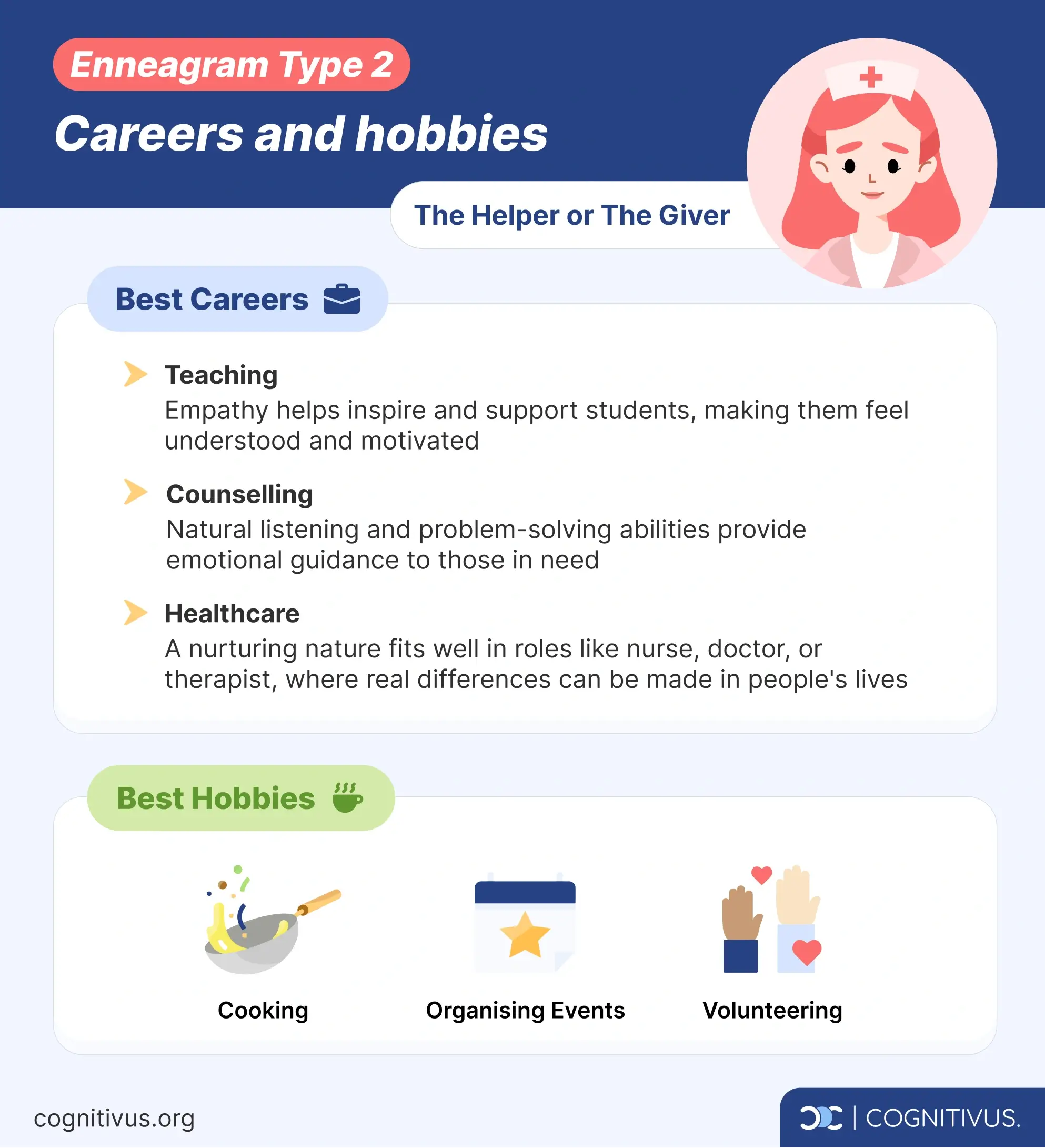
Best jobs for type two
In the workplace, Type Twos excel in roles that allow them to help others and build meaningful connections. Here are a few career paths where you can truly shine:
- Teaching: Your empathetic nature makes you an excellent educator; whether working with children or adults, you have the ability to inspire and support, making them feel understood and motivated to grow.
- Counselling: As a natural listener and problem solver, you’re well-suited to a career in counselling. You offer emotional support and guidance, perfect for helping others navigate life’s challenges with kindness and compassion.
- Healthcare: This field allows you to channel your caring nature into practical action; whether you’re a nurse, doctor, or therapist, you can make a real difference in people’s lives.
Best hobbies and interests for type two
Beyond your career, hobbies are a great way to express your nurturing side or relax and recharge. As a Type Two, you often enjoy activities that let you connect with others or show your care for those around you.
- Cooking: Whether you’re hosting a dinner party or baking treats for a friend in need, cooking allows you to nurture others while enjoying a creative outlet.
- Organising Events: From planning birthday parties to community fundraisers, you likely enjoy organising events where people can come together and create meaningful experiences.
- Volunteering: Giving your time and energy back through volunteer work is a perfect way for you to make an impact in your community. This could be working at a food bank, mentoring, or supporting a local cause.
As well as these, to balance your natural tendency to give, consider self-care activities that help you focus on your own well-being. Hobbies like yoga, journaling, or meditation can help you relax and recharge, ensuring that you have the energy and emotional strength to continue supporting others without burning out.
Enneagram Type 2 Compatibility and Relationships
As a Type Two, your nurturing and supportive nature shines in all your relationships. You are often drawn to people who appreciate your care while also providing stable and complementary energy. Here’s how you pair with other Enneagram types in both romantic relationships and the workplace:
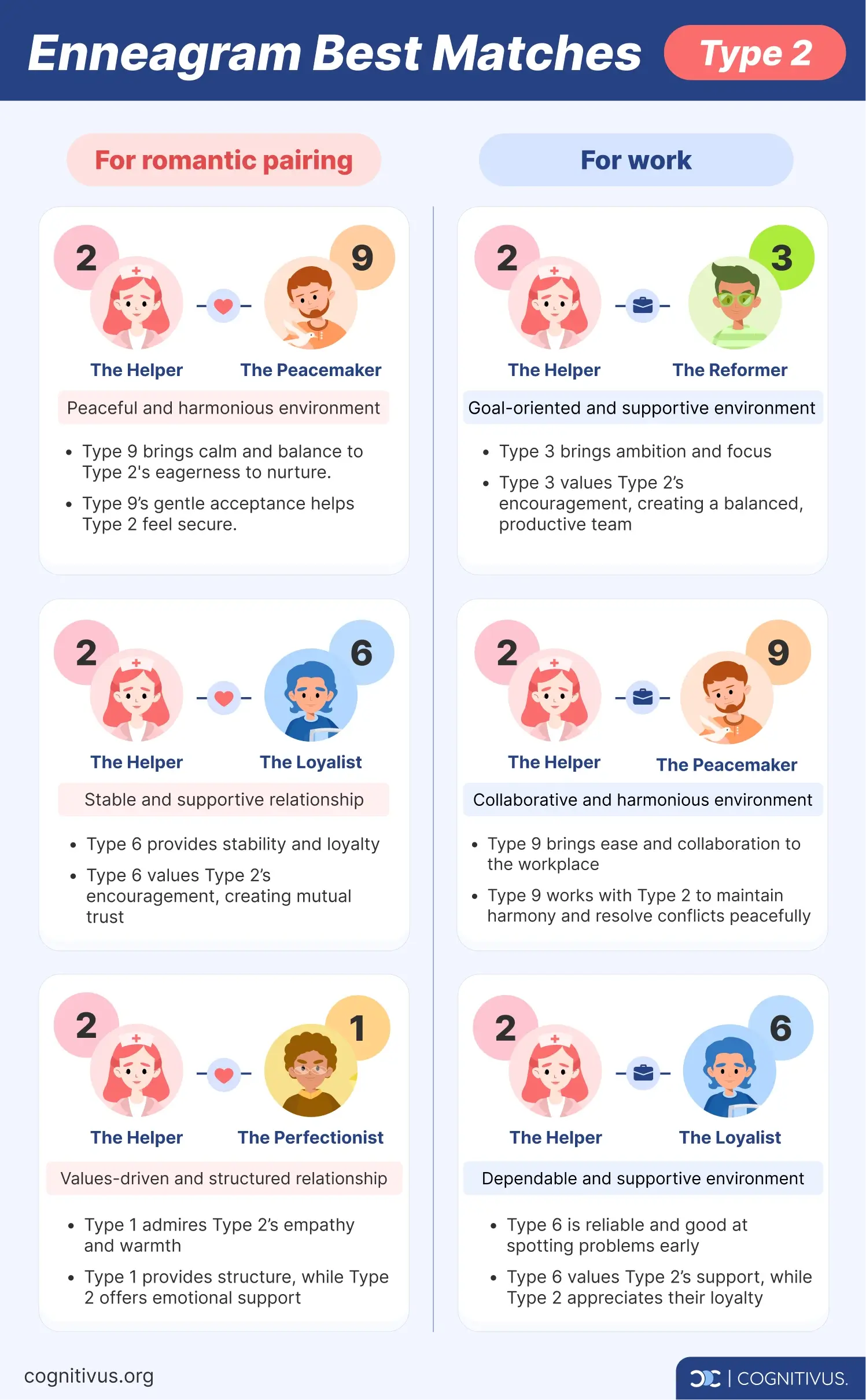
Best matches for romantic pairing
- Type 9 (The Peacemaker): Type Nines bring a sense of calm and stability to relationships. They help create a peaceful and harmonious environment to balance your eagerness to care for others. They are gentle and accepting, which allows you to feel secure in the relationship. If you’re feeling overwhelmed by your own emotions, a Type Nine partner can simply be there for you and offer quiet support, balancing your emotional intensity with their peaceful demeanour.
- Type 6 (The Loyalist): Sixes are reliable and dependable, which pairs well with your warmth. You both value trust and loyalty, creating a supportive relationship. Sixes deeply appreciate your encouragement, and their steadfastness helps you feel secure. A Type Six partner will be there for you consistently through a tough time, while you help them navigate their own worries by offering a listening ear.
- Type 1 (The Perfectionist): Type Ones have a strong sense of right and wrong, and they admire your empathy and compassion. Together, you create a values-driven relationship. You bring warmth and emotional support, while they bring structure and a sense of purpose. For example, if you’re working through a problem, an Enneagream Type 1 partner will approach it with logic and ethics, while you approach it with care and consideration for the people involved. This balance makes for a well-rounded relationship.
Best matches for work
- Type 3 (The Achiever): Type Threes are ambitious and goal-orientated, and they appreciate your supportive nature. As a Type Two, you love encouraging others and helping them reach their full potential. In turn, Enneagram Type Threes bring a focused, results-driven energy that helps you stay on track with your goals. While you might be the one cheering everyone on in a team setting, they work on setting ambitious targets for the team to achieve. This partnership creates a dynamic balance between emotional encouragement and practical achievement.
- Type 9 (The Peacemaker): Type Nines are easygoing and collaborative. Together, you create a supportive and harmonious work environment where everyone feels valued. For instance, if workplace tensions rise, you’ll both work together—Type Nine offering calm solutions and you providing emotional support to those affected, helping to resolve conflicts and maintain a positive environment.
- Type 6 (The Loyalist): Type Sixes are dependable and good at spotting problems early. They appreciate your support, and you value their loyalty. At work, 6s help plan for challenges, and you make everyone feel safe and encouraged. Together, you form a strong team. Type Six focuses on preventing issues, while you keep the atmosphere positive and supportive, helping things run smoothly.
Compatibility with other Enneagram types
Here’s a brief look at how Type Twos interact with other Enneagram types:
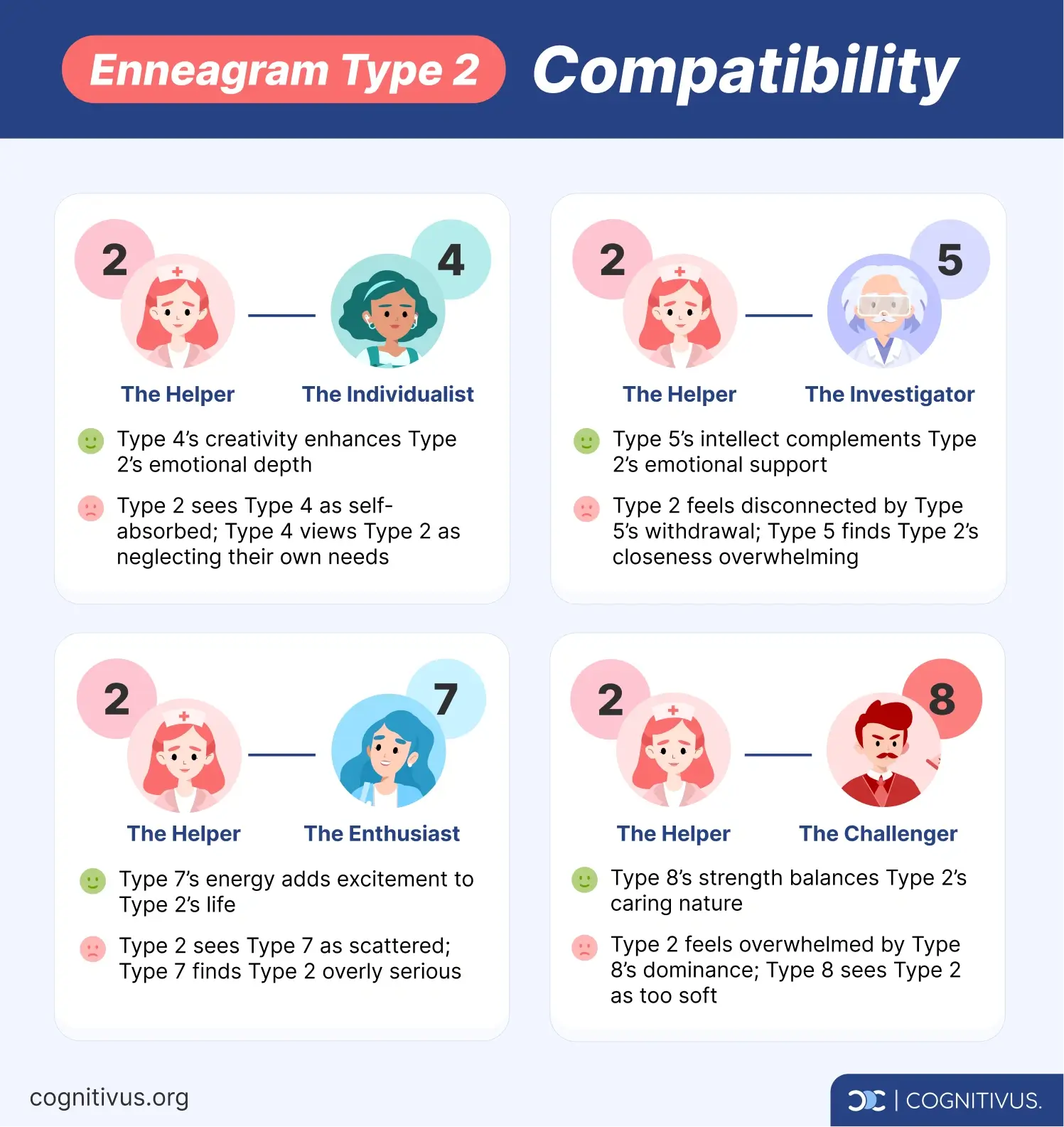
Type 2 vs Type 4 (The “Individualist”)
Type 4 brings creativity and emotional depth, making for a meaningful connection. However, you might see Enneagram 4 as too self-absorbed or moody, while they could feel like you focus too much on others and not enough on your own emotional needs.
Type 2 vs Type 5 (The “Investigator”)
Type 5 provides intellectual insight, while you offer emotional support; you balance each other well. But, you may feel disconnected if they become too withdrawn, while they might see your need for emotional closeness as overwhelming.
Type 2 vs Type 7 (The “Enthusiast”)
Type 7’s fun and spontaneous energy bring excitement to your life while you provide the emotional grounding that Type 7 sometimes needs. Sometimes, you might find Type 7 too carefree and scattered, while you might feel overly serious or emotional to them.
Type 2 vs Type 8 (The “Challenger”)
Together, you create a powerful dynamic. Type 8’s confidence and strength balance well with your caring nature. However, Type 8’s intensity or dominance can get overwhelming, and they might see you as too soft.
Famous Enneagram Type Twos
Whether through their real-life acts of kindness or their on-screen portrayals of caring characters, Type Twos make a significant impact on the people and stories around them.
Famous Enneagram type 2 celebrities
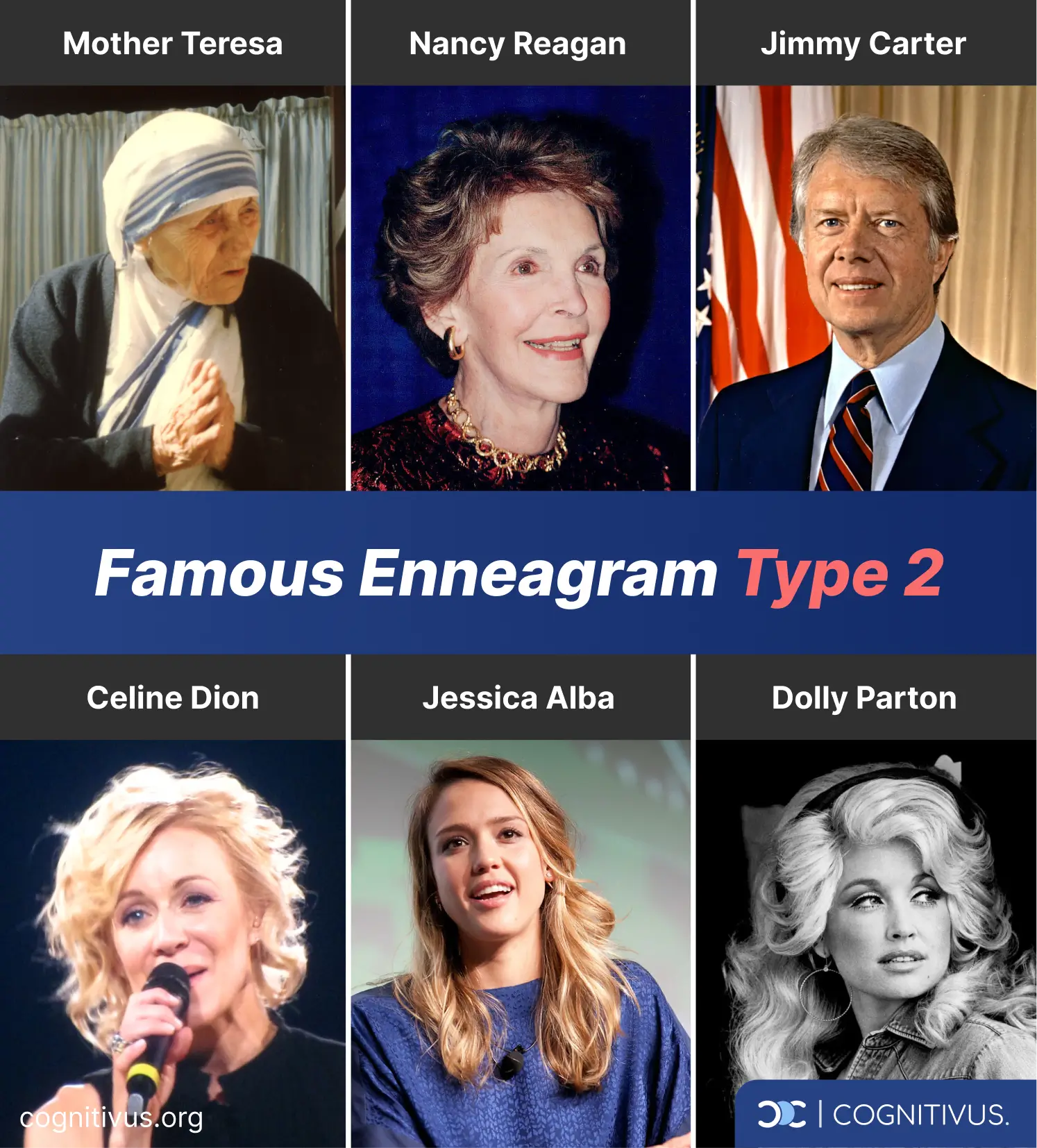
- Mother Teresa: Perhaps one of the most famous Helpers, Mother Teresa devoted her life to serving the poor and sick. Her selflessness and desire to care for those in need embody the highest qualities of Enneagram Type 2.
- Nancy Reagan: As First Lady, Nancy Reagan played a supportive role to her husband, President Ronald Reagan, while also championing the “Just Say No” drug awareness campaign, showcasing her desire to help the youth of America.
- Jimmy Carter: Former President Jimmy Carter is known not only for his time in office but also for his humanitarian efforts post-presidency. His work with Habitat for Humanity to build homes for those in need shows the caring, service-orientated side of Type Two.
- Celine Dion: The world-renowned singer Celine Dion is not only known for her powerful voice but also her generous spirit. Her close relationships with her fans and her dedication to her family reflect her nurturing, Helper nature.
- Jessica Alba: As a well-known ESFJ (a type associated with Enneagram 2), Jessica Alba is recognised for her kind, caring nature. Beyond her successful acting career, she founded The Honest Company, focusing on products that promote the well-being of families and children.
- Dolly Parton: Known for her warm heart and generous spirit, Dolly Parton is a true example of a Type 2 Helper. Beyond her successful music career, she has always shown a deep commitment to giving back. Her Imagination Library, which provides free books to children, is just one example of how she uses her influence to help others. Dolly’s caring nature and constant desire to support her community reflect the nurturing qualities of a Type 2, making her beloved by many.
Famous Enneagram type 2 fictional characters
In literature, film, and TV, Enneagram Type Twos are often portrayed as empathetic, nurturing, and deeply invested in the well-being of others. These characters display the best and worst qualities of the Helper type, making them compelling and relatable figures.
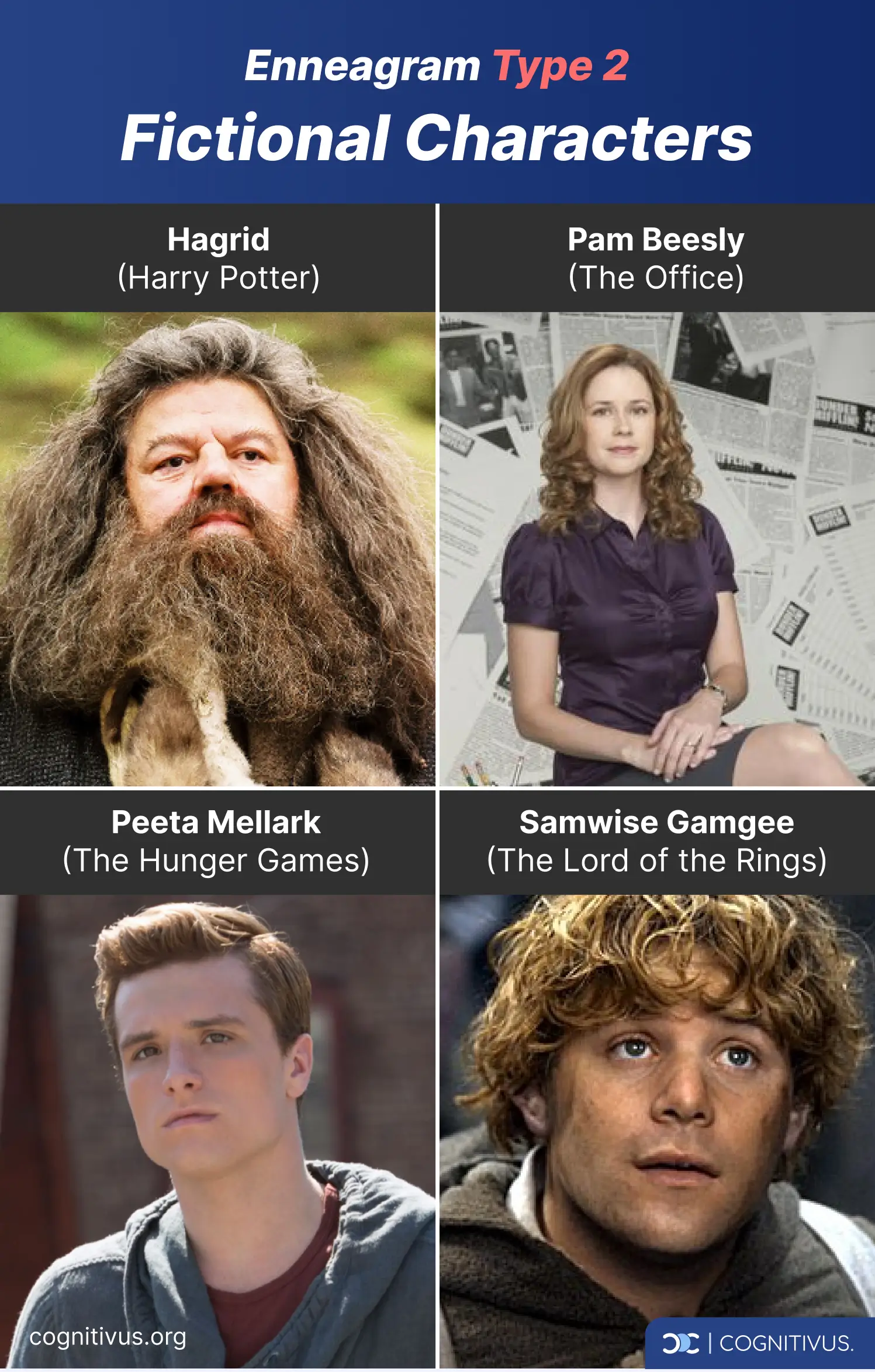
- Hagrid (Harry Potter): Rubeus Hagrid, the lovable giant from the Harry Potter series, is a prime example of a Type Two. Always looking after Harry, Ron, and Hermione, Hagrid’s warmth and desire to help are central to his character, even when his efforts sometimes get him into trouble.
- Pam Beesly (The Office): Pam Beesly cares deeply for her friends and colleagues, often going out of her way to help them. Whether offering emotional support to Jim or standing by her friends in difficult times, Pam’s Helper traits are a key part of her personality.
- Peeta Mellark (The Hunger Games): Peeta’s selfless devotion to Katniss, even risking his life for her, shows the deep loyalty and care that define the Helper type.
- Samwise Gamgee (The Lord of the Rings): Sam’s unwavering loyalty to Frodo in The Lord of the Rings is one of the most beloved displays of friendship in literature and film. Sam continually supports Frodo through every challenge, embodying the heart and soul of Type Two.
Frequently Asked Questions (FAQ)
Is there a difference between the “Helper” and the “Giver”?
Not really! Both "Helper" and "Giver" describe Enneagram Type Twos. They emphasise the same core traits: a strong desire to care for and support others, both emotionally and practically. Whether you call them Helper or Giver, Type Twos are known for their generosity and compassion in relationships.
Can Type Twos be independent?
Yes, absolutely! While Type Twos naturally focus on relationships and others, they can definitely learn to be independent by developing their sense of self-worth without needing outside validation. Personal growth activities, self-care, and hobbies help them find a balance between supporting others and taking care of themselves.
What MBTI type is Enneagram 2?
Type 2 (The Helper) is most commonly associated with the ESFJ personality type, which is seen as its MBTI equivalent due to their shared focus on relationships and nurture. A Type 2 wing 3 (The Helper with a Three wing) is often linked with the ENFJ personality type. Both ESFJs and ENFJs share the Helper’s focus on relationships, support, and caring for others.

